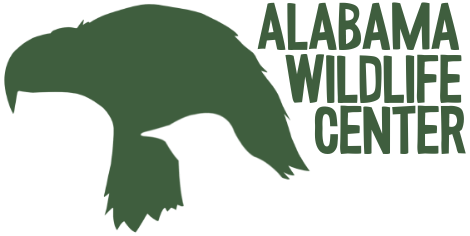Is it orphaned?
Click here to read this important information first. If you still have questions, call our Wildlife Help Line: 205-663-7930, Ext. 2.
Should I feed it or give it water?
It is usually best NOT to give it food or drink (unless our Help/Info Line has advised otherwise). Feeding wildlife the wrong formula/ food can do more harm than good, so it’s important to get it proper care as soon as you can–that’s what we’re here for! But don’t delay in bringing it to us for care. The wrong food or drink as well as prolonged, unnecessary lack of food/drink can cause irreversible damage to wildlife.
Where is the AWC Rehabilitation Clinic?
Click here for our address and directions.
What are the Rehab Clinic’s hours?
9:00AM-5:00PM, 7 days a week – open every day of the year (including all holidays!)
What happens to birds once they’re brought to AWC for care?
- You’ll be asked to complete an admission form that gives our staff all the information they need on the bird’s situation. It’s helpful if you can report the precise location the bird was found, and if you can locate the nest, that may be very important information.
- Finders (we call people who find birds and bring them to us “finders”) will be given a finder response post card to take home. When you fill out the card and affix adequate postage and mail it to us, we will update you on the status of the bird you delivered to us. Patient status information is not given by telephone, email or Facebook.
- The bird will be taken to an exam room. If we have numerous birds awaiting exam, our specialists will do triage and examine the bird that is most in need of care first.
- Specialists will stabilize the bird – the process for this varies dependent upon the species, age, injuries, temperature, etc.
- While it is our primary goal to help birds get healthy and return them to their natural homes, there are times when the hard choice must be made to humanely euthanize a bird. While we all wish it were possible to save every creature in pain, sometimes the only compassionate choice is to euthanize.
- AWC will provide needed housing, shelter, medicine, medical care, physical rehabilitation, and any needed care to assist the bird to good health and to develop normal, species-specific behaviors.
- Whenever possible, AWC will go above and beyond to reunite healthy babies and juveniles with their original nest family. Mom and Dad are always the best choice to raise young birds. If you are willing, we may contact you for assistance in returning them to their original nest. Sometimes we can even find a foster situation.
- Once healthy–and for babies/juveniles that could not be reunited with their parents or fostered but have developed enough to survive on their own–AWC will release the bird back into the wild. For birds brought to us as adults, we will strive to return them to the exact place they were originally found, since many species may have established hunting/gathering grounds or may have a mate and/or babies that are awaiting their return.
Is it true that wild bird parents will reject their young after babies have been handled by humans?
NO! This is a complete myth. The truth is birds can’t smell, so they can’t tell if a baby has been handled by humans. Once babies are returned to the nest, parent birds will continue caring for them as usual, and back with Mom and Dad provides the best chance for their survival.
Can I keep wildlife as a pet?
No. It is illegal to possess any native wild animal without permits from state wildlife agencies and from the U.S. Fish and Wildlife Service. Anyone illegally possessing native wildlife in the U.S. is subject to fines, imprisonment, or both. In addition to being illegal, possession is detrimental to the animal. While juvenile animals may appear cute and cuddly, when they grow up they will develop natural urges making them unsuitable as pets. It is simply inhumane to deprive a wild animal of its natural behavior and home in the wild.
